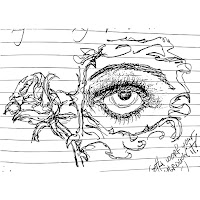The Invisible Prison of Mental Illness
In many states, if not most states, if I commit a crime, maybe a serious crime, I can do my time and get paroled. If I prove that I am rehabilitated and am worthy of re-entering society, I can regain my freedom. Which is not to say, that life will be easy now. Life for an ex-felon is pretty damn hard, I am sure.
But, I would be an “ex-convict”, meaning I am “no longer” a criminal. I would face considerable barriers to employment, although this is not supposed to be the case. I am fully aware that it is.
Making a “criminal mistake” can be forgiven, as it were. For those of us with neurological challenges that have resulted in “breakdowns” , there seems to be no possibility of “parole”. The ADA laws are supposed to protect citizens with disabilities, however many employment forms make a direct reference to mental illlness. Or, questions are “shaded” to indicate their possibilities.
The real difference however, between an actual “crime” and “mental disability”, is that, in most ways, the former criminal can leave the jail walls behind them. For the neurologically disabled, the prison (cell, jail) walls are carried with us. It is a turtles shell we cannot shed. Invisible, but still there, confining movement; heavy stiff leather clothing that always feels too tight.
I have heard mental disability described as a “waking nightmare that never stops”. A nightmare that prevents sleep and fills the waking days with an unappeasable addiction for sleep. Spiders under the skin, ever spinning webs inside the mind. Centipedes that when cut in half become two and then four and then eight.
During the occasional stretches of time when we can fake normal behavior, the emotional toil is exhausting. “The world is a stage and we are but players.” What to do when you can never leave the stage, change the costume, remove the make-up, or be pushed aside as a social pariah. A leper to be avoided.
Continually told to “seek help”. Appease, ameliorate, medicate. As you are is unacceptable. You must become like us. You are broken.
That is the prison of mental illness; to know that you are broken and no one will ever accept your flaws, no matter much glue you apply.

The challenge now is to teach society to not only accept, but to integrate, respect, and even appreciate the mentally and emotionally disabled for their creative contributions and unique perspectives on life.
ReplyDeleteTo Unknown; true, very true. I have been educating others on this for nearly twenty years. The only difference I can state with certainty is that today, nobody is surprised when you talk about it. The actual cultural response seems to remain constant. “Somehow it’s still the MI person’s fault. And if they wanted to change they could. They’re just too weak to do it. “
ReplyDelete